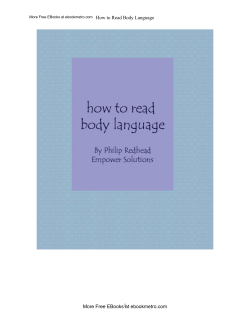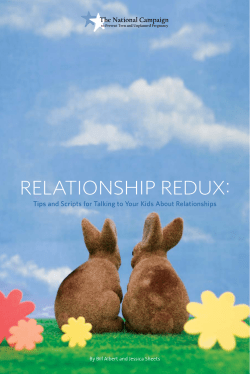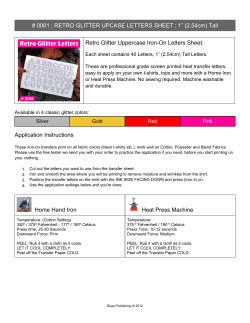
Testing this one … would this work
Lesson Seven Title: Preparation for Parenthood Theme(s): Importance of Healthy Relationships A Parenting Journey - Destination Parenthood: Arrive Prepared Time: 95 minutes Materials: Prior to the lesson: ● Preparation for Parenthood - Teacher Guide (pages # 38-41) Activity One: ● Qualities Of A Healthy Relationship (page # 240) ● Qualities Of An Unhealthy Relationship (page # 241) Activity Two: ● Dating Relationship Stoplight Game (pages # 242-259) Activity Three: ● Abuse Is About Power and Control - Laminated Poster (pages # 260-261) ● Cycle Of Violence - Laminated Poster (pages # 262-263) ● Qualities Of An Unhealthy Relationship (page # 241) Activity Four: ● Are You Ready To Be A Parent? - Student Handout (page # 264-266) Objectives ● to identify the components of both healthy and unhealthy relationships ● to discuss the good signs, warning signs and bad signs in dating relationships ● to consider the ways healthy dating relationships influence those relationships we have as adults and parents later in life ● to discuss the prevalence of violence in teen dating relationships Destination Parenthood: Arrive Prepared - A Resource For Educators: Grade 11 Parenting Peel Public Health: Family Health Division 905-799-7700 www.peelregion.ca 227 Lesson Seven ● to teach students that healthy relationships are necessary in order to build strong families and raise healthy children later in life ● to explore the qualities students would like to have in a dating partner and/or parenting partner ● to explain that parenthood is a challenging, lifelong commitment that should not be entered into without due consideration ● to consider his/her own readiness for parenthood on several levels - emotional readiness, physical health and financial stability Curriculum Expectations 11p9 - analyse behaviours, conditions, and environments that influence positive or negative growth and development of the foetus, infant, and young child (e.g., breastfeeding, bonding, infant stimulation, violence, addictions, neglect); 11p13 - demonstrate an understanding of the need for preparation to become a parent; 11p14 - demonstrate an understanding of the responsibility parents have for ensuring quality communication in their family; 11p15 - describe the nature of and the responsibilities involved in parenting; 11p16 - identify the factors involved in deciding whether or not to become a parent (e.g., social pressures, cultural influences, personal maturity and values, economic stability); 11p24 - explain why parenting is a lifelong commitment in our society; 11p25 - demonstrate an understanding of factors that influence the parenting process (e.g., delayed parenthood, strong parenting partnerships, a love and understanding of children); 11p56 - describe the skills and attitudes that can be developed to secure a safe and peaceful family, community, and social environment. Destination Parenthood: Arrive Prepared - A Resource For Educators: Grade 11 Parenting Peel Public Health: Family Health Division 905-799-7700 www.peelregion.ca 228 Lesson Seven 4MAT Quadrants 4L: Dynamic Learning, Creating Original Adaptations / Experiences, Taking Risks Procedure In Lesson Seven, students focus on the issues surrounding dating relationships. This topic is important not only because dating relationships gain increasing importance during adolescence, but also because they lay the foundation for the kinds of relationships teens will build as adults: Teens who make good relationship choices when they are young are more likely to make smart decisions about intimate relationships into adulthood. Inevitably, the people teens choose to date, and the healthy or unhealthy relationships that ensue, will shape their experiences in critical ways. This lesson is designed to compel students to think about their own criteria for dating relationships and to discuss ways to evaluate them. It also asks them to consider the qualities in a partner and a relationship that are necessary in order to build a strong parenting partnership in adulthood. Activity One - Class Discussion Regarding Dating Relationships - 20 minutes The student handouts entitled, Qualities Of A Healthy Relationship (page # 240) and Qualities Of An Unhealthy Relationship (page # 241) can be distributed to students at the beginning of this lesson. They should be completed individually and privately. You should not collect these handouts as the information written by students is personal. The handouts allow students to consider the nature of their current or past relationships and to evaluate how healthy or unhealthy they may be/have been. Destination Parenthood: Arrive Prepared - A Resource For Educators: Grade 11 Parenting Peel Public Health: Family Health Division 905-799-7700 www.peelregion.ca 229 Lesson Seven Ideas For Classroom Use You may also choose not to distribute the handouts before your discussion, but rather to use them as a personal reflective exercise at the end of the lesson. Tell your students that you will be discussing dating relationships during today’s lesson. Ask them to participate frequently during the discussion, as their input on this topic is very important. Here are some questions you might use to guide your discussion. ● How does a dating relationship normally get started? ● Where could you meet someone you might like to date? ● How do you know when someone is interested in you? ● What are the qualities you look for in a person you might like to date? ● What are some characteristics of healthy relationships? ● What are the qualities of unhealthy relationships? ● Are the qualities you value in a friendship the same or different from those you care about in a dating relationship? Explain your answer. Destination Parenthood: Arrive Prepared - A Resource For Educators: Grade 11 Parenting Peel Public Health: Family Health Division 905-799-7700 www.peelregion.ca 230 Lesson Seven After students have presented their ideas, share with them the reason that dating relationships are important as well as the connection between these relationships and their self-esteem. ● Why is it important to develop healthy dating relationships as teens? Dating lays the foundation for the kinds of relationships teens will build as adults: Teens who make good relationship choices when they are young are more likely to make smart decisions about intimate relationships into adulthood. The people teens choose to date, and the healthy or unhealthy relationships that follow, will shape their experiences in significant ways. In fact, habits that are formed, either positive or negative, can influence their health and that of their future children, should they decide to become parents. ● How do you think self-esteem is related to dating relationships? When we feel good about ourselves, we are more likely to choose dating partners who are good for us. There is a saying that, “we teach people how to treat us”. In other words, how we care for ourselves and behave with other people gives potential dating partners clues as to how they should treat us. So, if we feel good about ourselves and respect ourselves, and treat others nicely, we are showing people how we would like to be treated. This is the connection between self-esteem and dating relationships. Destination Parenthood: Arrive Prepared - A Resource For Educators: Grade 11 Parenting Peel Public Health: Family Health Division 905-799-7700 www.peelregion.ca 231 Lesson Seven Ideas For Classroom Use For a class or homework assignment, you could ask students to write an internet dating profile. Ask them to pretend they are 25 years old and single. Have them write a profile that could be posted on an online dating website for adults. The profile should outline both their personal qualities and those they are looking for in a longterm partner, potential spouse and co-parent. This activity is entirely fictional and is not meant to encourage the use of internet dating. Given the risks associated with online dating at any age, as part of this assignment you may want to ask teens to research some of the safety tips for teens online. The following sites post helpful information on the topic of safe internet use: www.safeteens.com, www.safekids.com, www.kidshealth.org, www.wiredsafety.org, www.media-awareness.ca/english/teachers. Activity Two: Dating Stoplight Game - 30 minutes Tell your students that they will be playing a game that deals with dating relationships. Explain that even if they are not ready or willing to engage in dating relationships at this stage in their lives, it is helpful to spend some time thinking about both the kind of person and the type of relationship that would be good for them in the future. While playing the game, students will be categorising statements as bad signs, warning signs or good signs in a dating relationship. Ask them to be ready to explain their choices. Destination Parenthood: Arrive Prepared - A Resource For Educators: Grade 11 Parenting Peel Public Health: Family Health Division 905-799-7700 www.peelregion.ca 232 Lesson Seven Here are the instructions to set up the Dating Stoplight Game (pages # 242-259). On the top left corner of your chalkboard, use tape or magnets to attach the red stoplight card that reads “These are bad signs in a Destination Parenthood: Arrive Prepared - A Resource For Educators: Grade 11 Parenting Peel Public Health: Family Health Division 905-799-7700 www.peelregion.ca relationship”. Place the corresponding yellow and green stoplights underneath, as you see here. Destination Parenthood: Arrive Prepared - A Resource For Educators: Grade 11 Parenting Peel Public Health: Family Health Division 905-799-7700 www.peelregion.ca Destination Parenthood: Arrive Prepared - A Resource For Educators: Grade 11 Parenting Peel Public Health: Family Health Division 905-799-7700 www.peelregion.ca The graphic to the left appears on each scenario card. Shuffle the Stoplight scenario cards to ensure that they are not in order. Destination Parenthood: Arrive Prepared - A Resource For Educators: Grade 11 Parenting Peel Public Health: Family Health Division 905-799-7700 www.peelregion.ca 233 Lesson Seven The object of this game is to decide which scenarios are most compatible with each of the following three statements: “these are bad signs in a relationship”, “these are warning signs in a relationship” and “these are good signs in a relationship”. Attach the appropriate answers to the chalkboard beside the corresponding stoplight with tape or magnets. There are several ways that you can play this game. You can read the scenarios aloud and ask students where they think they best belong. You can give scenarios out to groups of students and they can come to a consensus. You might also consider placing the scenarios around the room and asking for volunteers to place them beside the matching stoplight on the chalkboard. No matter what pedagogical strategy you use to play this game, be sure that you ask students for explanations regarding their choices. The most important part of this activity is the discussion around whether each scenario constitutes a good, a warning or a bad sign in a dating relationship. It is in this arena that students will be able to discuss their various points of view. Your role in this game is to facilitate and mediate the conversations of your students. When there is disagreement, you might choose not to place the scenario beside one statement, but rather choose to set it aside for further debate and discussion. If the scenario clearly represents a bad or warning sign, be sure to make this point clear for your students. There are fifteen scenario cards. Five scenarios correspond with each coloured stoplight: red, yellow and green. Destination Parenthood: Arrive Prepared - A Resource For Educators: Grade 11 Parenting Peel Public Health: Family Health Division 905-799-7700 www.peelregion.ca 234 Lesson Seven While there may be some discrepancies, the following is a list of suggested correct answers. RED LIGHT: These are bad signs in a dating relationship. 1. 2. 3. 4. You are afraid of this person’s temper. The person you are dating threatens or hurts you. Your girlfriend or boyfriend pressures you to do things you do not want to do. The person you are dating demands to know where you are, who you are with, and what you are doing. The person you are dating threatens to hurt herself or himself if you break up. 5. YELLOW LIGHT: These are warning signs in a dating relationship. 6. 7. 8. 9. 10. Your boyfriend or girlfriend sometimes criticises you or people you care about. Your boyfriend or girlfriend makes you feel nervous about sharing your ideas with him/her. You rarely get to plan what the two of you will do together. You say that you agree with the person you are dating, even though you really disagree with him/her, because you are afraid that a fight might end the relationship. The person you are dating tells you not to hang out with certain friends. GREEN LIGHT: These are good signs in a dating relationship. 11. 12. 13. 14. 15. Your girlfriend or boyfriend respects your feelings and your opinions. You usually feel happy when you are with this person. The person you are dating talks to you about his/her feelings. Your boyfriend or girlfriend celebrates your successes and s/he is happy when good things happen to you. You enjoy being with the person you are dating, but you also enjoy spending time apart. Destination Parenthood: Arrive Prepared - A Resource For Educators: Grade 11 Parenting Peel Public Health: Family Health Division 905-799-7700 www.peelregion.ca 235 Lesson Seven Activity Three: Class Discussion About Violence In Relationships - 15 minutes Recent Canadian research suggests that about one in four women between the ages of eighteen and twenty-four experience violence at the hands of their partners (Red Cross, 2007). Girls of all ages are at greater risk of sexual or physical assault than boys. Since so many Family Studies classes are dominated by young women, it is a good idea to talk about these issues in your classes. Consider discussing the characteristics of abuse and the cycle of violence with your classes. On pages # 260-263, you will find some helpful resources to guide your discussion. When teens talk about violence in relationships, they often mention only physical violence: Yet, relationships do not have to involve physical aggression to be unhealthy or violent. Emotional assault (i.e.: an attack on someone’s self-esteem that can be psychologically destructive) is also very prevalent in teen dating relationships. The Dating Stoplight game (pages # 242-259) is designed to reveal a number of other forms of control and violence, particularly those that are more subtle. The Canadian Red Cross website also has an excellent description of various forms of violence in relationships. Please visit www.redcross.ca/article.asp?id=011812&tid=001#what%20is for more information. Being able to identify abusive behaviour equips teens with the language and the skills necessary to get help. Suggest that they talk with their parent(s), a family member, a guidance counsellor or another trusted adult. Due to the sensitivity of this content, and the fact that teens may feel safer talking anonymously about the topic at first, it is important to provide students with information about where to go for assistance and/or counselling if they are experiencing violence in their relationship(s). Students can call Kids Help Phone at 1-800-668-6868 or Peel Public Health at 905-791-7800. Destination Parenthood: Arrive Prepared - A Resource For Educators: Grade 11 Parenting Peel Public Health: Family Health Division 905-799-7700 www.peelregion.ca 236 Lesson Seven Activity Four: Are You Ready To Be A Parent? - 10 minutes Ask students to research the components of readiness for parenthood. There are many factors involved in the decision of whether or not to become a parent including social pressures, cultural influences, personal maturity and values as well as economic stability. Distribute the student handout entitled; Are You Ready To Be A Parent? on page # 264-266. Students can complete their research at home or in the school’s computer lab, if you can book it for your class. Ideas For Classroom Use The impact of a teen pregnancy is far-reaching and significant for young women and men. The Public Health Agency of Canada reports that when young women become pregnant, they must make difficult decisions, and these decisions can play a role in determining their future health and well-being. Regardless of whether the young woman chooses to terminate her pregnancy, place her child for adoption, or raise the baby, the decision often brings with it detrimental physical, emotional and financial consequences. Similarly, the consequences that young men who become parents at a young age will experience are life-altering. Teen fathers often have a hard time adjusting to their new role. Their education and financial futures can also suffer. For these reasons, it is a good idea to include some information about the experiences of teenage parents when you discuss readiness for parenthood in general. Please see the Teacher Guide for Lesson Seven (pages # 38-41) for specific research and further information. Possible Extensions Many authors have written about the qualities required in a healthy and mature relationship. Have students research the ideas of a few scholars and present them to Destination Parenthood: Arrive Prepared - A Resource For Educators: Grade 11 Parenting Peel Public Health: Family Health Division 905-799-7700 www.peelregion.ca 237 Lesson Seven the class. Your students could research people who discuss relationships in popular culture (Dr. Ruth K. Westheimer, Dr. Phil McGraw, John Gray, Barbara De Angelis, etc.) as well as academic writers (Dr. Beth Hedva, Dr. Sol Gordon, etc.) and compare the ideas presented in both kinds of writing. The Peel Public Health Changes In Me curriculum that is available online (at www.changesinme.ca) includes activities that get kids thinking about the responsibilities of parenthood. Since they are designed for younger children (grades four to six) you may need to adapt them for older students. You will find some ideas in Lesson Four of Changes In Me at www.peelregion.ca/health/commhlth/bodyimg/changes-inme/download/lesson-four/index.htm. If you are looking for an independent study topic, offer students the chance to research how violence in families affects the growth and development of children. Peel Public Health’s website outlines these affects on the page entitled, Family Violence - Health Effects on Children at www.peelregion.ca/health/sexual-assault/c-effects.htm#children. Possible Assessment This lesson provides both informal and formal opportunities for evaluation. You can observe and assess student participation in the various classroom discussions or during the Stoplight Game. Alternatively, or additionally, there is a rubric that accompanies the Are You Ready To Be A Parent? assignment on pages # 264-266. Destination Parenthood: Arrive Prepared - A Resource For Educators: Grade 11 Parenting Peel Public Health: Family Health Division 905-799-7700 www.peelregion.ca 238 Lesson Seven Resources Beben, Alyson. (2003). Changes In Me: A Resource For Educators On Puberty And Adolescent Development. Region of Peel: Peel Health. Beben, Alyson. (2007). Human Reproduction, Sexuality and Intimacy. In Healthy Active Living: Keep Fit, Stay Healthy, Have Fun. Ted Temertzoglou. Toronto: Thompson Educational Publishing, Incorporated. Best Start. Ready For Parenting: Mate Matters and More. www.healthbeforepregnancy.ca/parenting.htm. Childbirth Connection. (2007). Planning Pregnancy. www.childbirthconnection.org/article.asp?ck=10303. Dacey, John and Maureen Kenny. (1997). Adolescent Development 2nd Edition. Toronto: Brown and Benchmark. Hickling, Meg. (1996). More Speaking of Sex. Kelowna, B.C.: Northstone Publishing. March of Dimes. (2007). Before You Are Pregnant - Are You Ready? www.marchofdimes.com/173.asp. Peel Public Health. (2007). Violence Prevention. www.peelregion.ca/health/topics/injury/violprev.htm. Peel Public Health. (2007). Parenting … Is it For You? www.peelregion.ca/health/healthbefore-pregnancy/ready.htm#parenting. Red Cross. (2007). Does this seem unhealthy to you? www.redcross.ca/article.asp?id=000505&tid=030. Red Cross. (2007). What is ‘relationship violence’? www.redcross.ca/article.asp?id=011812&tid=001. Schuver, Andrea. (1999). “Parenting Education in School - It’s Not Just for Pregnant and Parenting Teens!” News and Views. Florida: Florida Network on Adolescent Pregnancy, Parenting and Prevention. Destination Parenthood: Arrive Prepared - A Resource For Educators: Grade 11 Parenting Peel Public Health: Family Health Division 905-799-7700 www.peelregion.ca 239
© Copyright 2025









